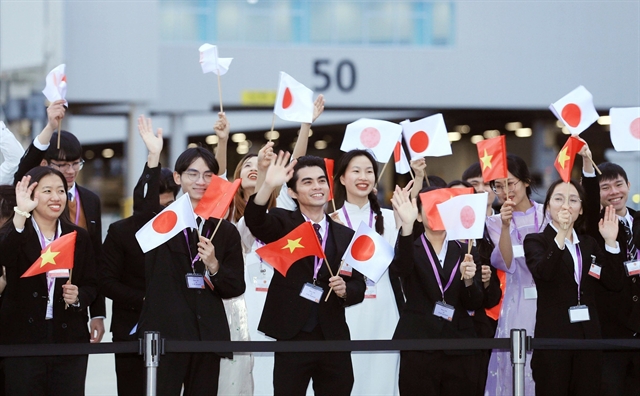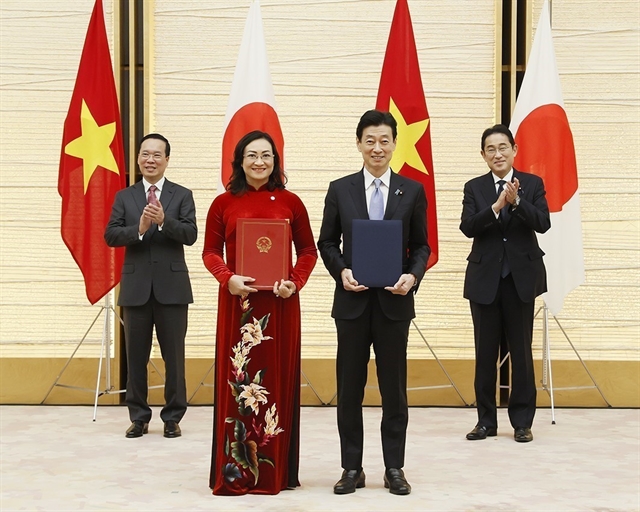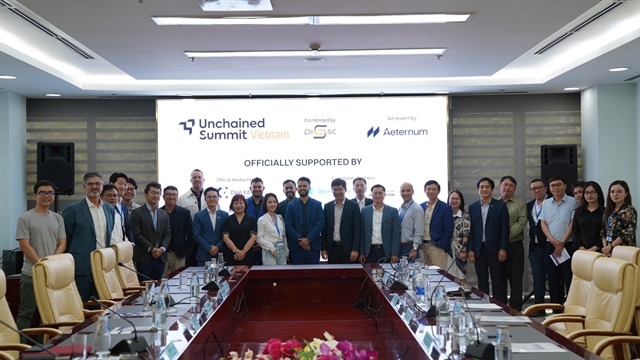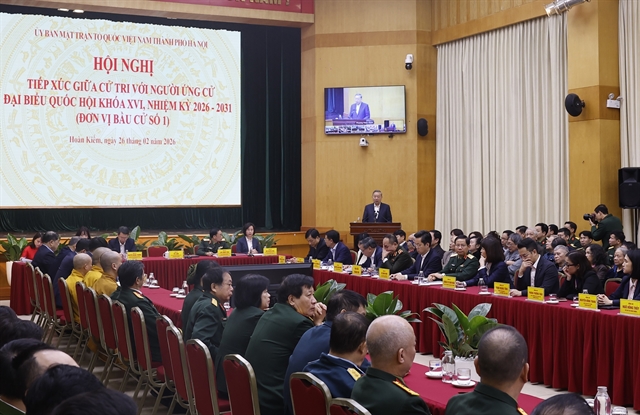 Politics & Law
Politics & Law

 |
| Officials, staff of the Consulate General, and the Vietnamese community in Fukuoka bid farewell to President Võ Văn Thưởng and his spouse at Fukuoka International Airport, concluding his four-day official visit to Japan last week. — VNA/VNS Photo Thống Nhất |
Mai Hương
HÀ NỘI — Vietnamese President Võ Văn Thưởng concluded his four-day official visit to Japan last week with the pivotal event of elevating their relations to a Comprehensive Strategic Partnership on November 27 – marking the highest tier in partnership for Peace and Prosperity in Asia and the World.
This transformative step holds immense significance for their bilateral relationship and aligns with the foreign policy visions of both sides. It serves to strengthen the win-win relationship, providing a framework through which each country can contribute to the attainment of their respective goals.
This newly forged partnership, tied to the commemoration of the 50th anniversary of the establishment of diplomatic relations, recognises Japan among Việt Nam’s "top-tier" partners, a select group that currently includes the United States, China, Russia, India and South Korea.
Over the past five decades, Japan-Việt Nam relations have seen a steady progression, flourishing to a level that diplomats now describe as the zenith of their history.
For Việt Nam, Japan holds the position as the largest provider of Official Development Assistance (ODA) to Việt Nam, ranks second in labour collaboration, third in foreign investment and tourism, and fourth in terms of trade.
Japan's role as Việt Nam’s principal ODA provider, with a total value exceeding US$27.5 billion since 1992, has played a pivotal role in infrastructure expansion. With nearly 5,200 valid FDI projects totalling over $71 billion as of August 2023, Japanese investments have contributed significantly to Việt Nam's economic development. In trade, Japan ranks fourth, with a bilateral turnover nearing $25 billion in the first eight months of 2023.
However, amidst the backdrop of global uncertainties and evolving geopolitical and economic landscapes, the Việt Nam-Japan partnership faces the imperative to adapt. The challenge lies in ensuring the resilience and sustainability of this robust relationship in the face of changing circumstances.
Pillar of economic partnership
Economic partnership remains a dominant pillar, gaining renewed prominence as Việt Nam sets ambitious goals in its 13th National Party Congress. The nation aspires to transition from a lower-middle-income economy to a developed, industrialised nation with high income by 2045. Key policy actions include enhancing public capacity, improving the legal framework, accelerating structural reforms, and focusing on human resource development and the National Innovation System.
Việt Nam's economic landscape, having experienced a slowdown since 2016 due to the depletion of conventional growth drivers, is pivoting towards innovation and digital transformation to fuel income growth. The Fourth Industrial Revolution (Industry 4.0) and digitalisation trends play a crucial role in upgrading the manufacturing sector. The Government's 2019 Resolution on Industry 4.0 envisions Việt Nam as a leader in smart manufacturing and innovation in Asia by 2045.
 |
| President Võ Văn Thưởng and Japanese Prime Minister Kishida attend the exchange of MOU on cooperation in the energy transition between the Vietnamese Ministry of Industry and Trade and the Japanese Ministry of Economy, Trade, and Industry. — VNA/VNS Photo Thống Nhất |
In the book “Vietnam 2045: Development Issues and Challenges” launched by the Economic Research Institute for ASEAN and East Asia (ERIA), it envisions the future of Japan-Việt Nam industrial cooperation, highlighting progress in summit diplomacy, cooperation areas post-COVID-19, digital transformation, and supporting industries with the emphasis on sustained high and green economic growth, transitioning from input-driven to innovation-driven growth, and collaboration with Japan, especially in digital transformation.
In this economic tapestry, Japan's support assumes an important role. The collaboration aims to contribute to Việt Nam's industrialisation and modernisation efforts, with Japan committing to continue investing in Việt Nam. This cooperation not only aligns with Việt Nam's goals but also ensures the diversification of supply chains and the provision of a labour force.
Beyond economic ties, the Comprehensive Strategic Partnership envisions multi-faceted cooperation, encompassing defence, security, culture, people-to-people exchanges, education, training, tourism, and connectivity between localities. The partnership is poised to contribute positively to global peace, stability, cooperation and development.
Vietnamese President Võ Văn Thưởng, in a speech at the National Diet of Japan last week, proposed six key enhancements to fortify the Comprehensive Partnership: 1) Strengthening political trust through comprehensive exchanges; 2) Prioritising economic ties, with Japan supporting Việt Nam's industrialisation and modernisation; 3) Envisaging closer cooperation in defence and security; 4) Fostering cultural exchanges, education, training, tourism, and connectivity; 5) Emphasising collaboration in international and regional affairs; and 6) Highlighting the importance of existing mechanisms like the Việt Nam-Japan Joint Committee for new initiatives.
On the other hand, Japan, facing its own challenges, including an ageing population and decreases in economic competitiveness, sees the partnership with Việt Nam as a strategic imperative, especially in its relationships with Southeast Asian nations and its broader Indo-Pacific vision.
In discussion with Asian journalists facilitated by Keizai Koho Centre (Japan Institute for Social and Economic Affairs) last month, Ryo Nakamura, Director-General, Assistant Minister of Southeast and Southwest Asian Affairs Department, Japan’s Ministry of Foreign Affairs, acknowledged the need for redefined cooperation, considering the transformation of Japan-ASEAN ties over the past 50 years in the face of geopolitical and economic changes.
Amid global instability, including conflicts like the Russia-Ukraine war, the China-US rivalry, North Korea and the East Sea (internationally known as the South China Sea) issues, the paradigm shift in Japan-ASEAN cooperation extends beyond traditional economic and cultural ties to include security concerns, economic transitions, and the impact of infectious diseases, including COVID-19.
ASEAN's increased economic and political stature, with a combined GDP of around US$3.6 trillion in 2022, has elevated its global influence. The evolving partnership also reflects a move from a 'patron-client' to a more 'equal' relationship, emphasising 'co-creation' to jointly address geopolitical, economic, and social challenges. This vision aligns with the ASEAN Outlook on the Indo-Pacific, focusing on digital technology, entrepreneurship, and addressing common challenges.
Nakamura underscored the importance of addressing the evolving economic dynamics between Japan and ASEAN, emphasising the need to diversify cooperation and adapt to new priorities expressed by ASEAN countries. Japan recognises the individual agendas and perspectives of each ASEAN country, aiming to strengthen them collectively to peace, and prosperity, and maintain stability in the region.
Việt Nam, a crucial partner in ASEAN, is anticipated to play a key role in Japan's efforts to strengthen its relationships within ASEAN and advance its AIOP plan.
“The economic relationship between Japan and Việt Nam is also changing. Although you still have huge demand on infrastructure, you will also have many other demands right now, including, training people or tackling these new challenges like green economy or climate change. So the means of cooperation will be also diversified in that sense,“ he told Việt Nam News.
According to Masafumi Ishii, former Ambassador of Japan to Indonesia and Special Adjunct Professor of the Faculty of Law at Gakushuin University, Japan's limited resources may drive it to prioritise its assistance and relationships with other countries.
As competition for influence intensifies in Southeast Asia with rising prominence of China, Japan's primary goal is to support the unity and development of ASEAN countries. Việt Nam, alongside Indonesia and the Philippines, holds a prominent position in Japan's foreign diplomacy due to its substantial economic size and strategic regional position.
In addition, to address the changing perceptions of Japan across generations, a tailored diplomatic approach and the imperative for stronger, strategic cooperation that goes beyond economic ties to encompass security collaboration holds significance.
In the future, as Japan looks forward, taking into account the demographic challenges in ASEAN countries and the growth potential of the region, it strives to contribute through initiatives like enhancing human capacity, developing high-quality infrastructure, and engaging in collaborative efforts on sustainable and resilient supply chains. These efforts are in harmony with Việt Nam's goals, and the expected outcomes at the highest level of the relationship between the two sides are poised to bring about fruitful results in the times ahead. — VNS




